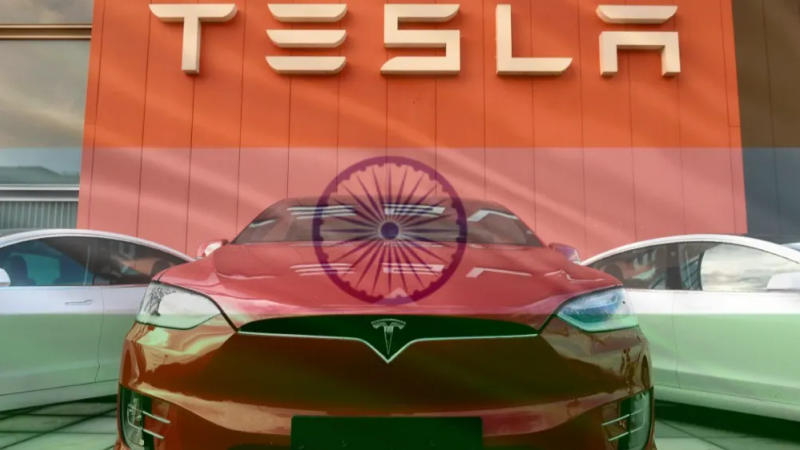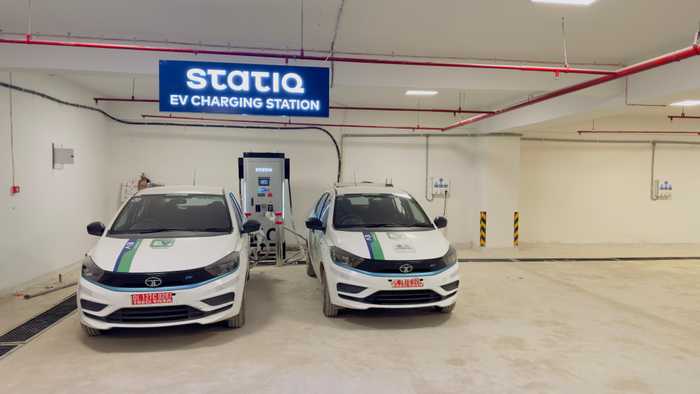Published 14:40 IST, March 18th 2024
Tesla's India entry set to revolutionise EV landscape
Domestic carmakers will also continue contributing to EV growth, says Maruti Suzuki's Shashank Srivastava.

EV push in India: For the last two months, amid signs of a fledgling demand for electric vehicles globally, the EV segment in India, instead of falling prey to gloom and doom has gone a step ahead to up the ante for its “Make in India” initiative.
In an exclusive interaction with Republic Business, Senior Executive Director, Maruti Suzuki, Shashank Srivastava said the policymakers are in the best place to make decisions to boost India's EV segment. The domestic auto players will continue making efforts to contribute to the government's vision for the EV segment, added Srivastava.

Image credit: Unsplash
Bharat Mobility 2024, the largest auto exhibition domestically, held during the first week of February in New Delhi, witnessed EVs steal the show. Akin to India's resilient economy, which has seen the highest GDP growth globally, the country's auto sector too is imperturbable to global trends.
Apart from major automotive players showcasing electric car technology at the grand event, leading EV players in the commercial vehicle and passenger vehicle segments, which include Tata Motors, Morris Garages (MG), and Mahindra & Mahindra, have a slew of launches in the pipeline.
Robust policies, such as the Scheme to Promote Manufacturing of Electric Passenger Cars in India, launched last week, are proving to open up India to EV majors such as billionaire Elon Musk's Tesla to establish a manufacturing facility.
More automobile manufacturers are diversifying into the EV segment. While India's largest car maker Maruti Suzuki is planning several EV launches in the next year, Chinese EV major BYD had recently launched its first sedan EV model Seal in India.
Ambitious EV Scheme
The Scheme to Promote Manufacturing of Passenger Electric Cars in India has been notified at an appropriate time. The announcement of concessional tariffs for global EV makers such as Tesla, including a major cut in customs duty is a government incentive to the EV majors for setting up manufacturing plants in India. The long-pending chorus from the likes of Musk to bring down India's 70 per cent import duty on cars, now gets fulfilled.
Shashank Srivastava, Senior Executive Director, Maruti Suzuki said the new policy of reduced import duty on EVs based on fulfillment of certain conditions, including investments, will open up many possibilities.
“The government would have considered multiple factors to arrive at this decision. They are the best judge for the overall economic growth measures,” said Srivastava. Srivastava further said that India's domestic automotive players will work continuously to contribute to the overall electrification of the PV in tune with the government's vision for auto industry growth.
BYD vs Tesla
At a time when Chinese EV major BYD is indulging in a neck-and-neck competition with Tesla, the opportunity is ripe for the US automaker's India foray.

Image credit: Unsplash
The policy to promote the production of EVs by foreign players is flexible and formulated with a long-term vision. The provision to allow companies to carry over unutilised annual imports into the next year signifies that India has kept in mind the market volatility with regard to the global geopolitical situation.
The EVs which almost cost Rs 30 lakh in India's auto market will benefit from the scheme. Besides, the scheme can be availed by companies that must commit a $500 million investment in India. Incentives are capped at Rs 6,484 crore per company.
The push to promote the manufacturing of electric cars in the policy which was notified by the Heavy Industries Ministry, is being steered by the Industry and Commerce Ministry's Department for Promotion of Industrial and Internal Trade (DPIIT). In an election year, where not many major policy measures are expected till the new government in the centre takes over, the scheme is a shot in the arm for India's EV segment.
EV present position
The Faster Adoption and Manufacturing of (Hybrid) and Electric Vehicles in India (FAME) scheme, which was mainly benefitting electric-run passenger vehicles at the moment is set to see an end to the incentives it offered.

EV sales took a hit in February with a slowdown to 7,200 EV units sold. This subdued sentiment is likely to persist owing to major EV players Tata Motors, MG and Mahindra & Mahindra-have announced a reduction in production.
Sales of EVs are abysmally low despite a price cut offered by the carmakers. As per the government's Vahan portal, Tata Motors has seen a month-on-month drop of 13 per cent in its EV registrations. India's largest EV maker, Tata Motors has of late pressed a price cut of Rs 1.2 lakh on its Tiago and Nexon EVs. MG also reduced the price of its Comet by Rs 1 lakh. The price cut notwithstanding, sales of EV passenger vehicles have been dwindling.
Green Hydrogen Adoption
Auto industry players see the transition to EV take some more time and suggest that more awareness be created. Notably, Union Oil Minister Hardeep Puri at the fourth edition of the Republic Summit said that boosting the charging infrastructure remains the key to the EV ecosystem. Besides, the use of coal-based electricity to power EV charging facilities is a challenge, that could be overcome with adoption of the green hydrogen energy.
The two and three-wheeler EV segments have witnessed robust sales. Carmakers are hopeful that the PV segment of electric vehicles, which as per the Society of Indian Automobile Manufacturers (SIAM) is merely 1.5 per cent of the total PV sales in India at present, will witness a boost in sales buoyed by a policy-level push.
“The recently announced EV policy for new entrants reinforces the “Make in India” momentum, with requirements of bank guarantees, minimum investment commitment, and local value addition,” said a Mahindra & Mahindra spokesperson, adding that EV policy will help accelerate the alternate fuel-based vehicles in India.
"Our born electric SUVs are on track to be launched in January 2025 with cutting-edge technology. Our products will speak for themselves,” the M&M spokesperson added.
Updated 16:19 IST, March 20th 2024




